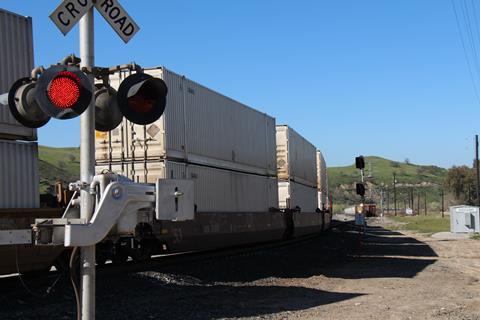
USA: The House and Senate have passed legislation to avert a major strike by forcing railway companies and trades unions to implement tentative agreements negotiated by a Presidential Emergency Board, which four unions had not ratified.
‘I know that many in Congress shared my reluctance to override the union ratification procedures’, said President Joe Biden on December 1. ‘But in this case, the consequences of a shutdown were just too great for working families all across the country.’
The Association of American Railroads said the contracts would:
- provide a 24% wage increase during the five-year period 2020-24, including an immediate payout on average of $16 000 upon ratification;
- include $5 000 in performance bonuses, with total average annual pay and benefits reaching $160 000 by the end of the contract period;
- maintain ‘some of the best healthcare plans in the nation’;
- provide an additional paid personal leave day per year;
- continue to provide multiple options for time off and, for those employees who operate trains, enhanced abilities to schedule time off.
Responses
‘As we close out this long, challenging process, none of the parties achieved everything they advocated for’, said AAR President & CEO Ian Jefferies. ‘The product of these agreements is a compromise by nature, but the result is one of substantial gains for rail employees.’
Railway Supply Institute President Patty Long said ‘a rail strike would have exacerbated an already fragile supply chain at a time when the industry is already struggling with hyper-inflation. This legislation prevents economic harm that would impact businesses and workers alike.’
American Short Line & Regional Railroad Association President Chuck Baker said ’short lines can now assure customers that there will be no service interruptions on our Class I railroad partners, and we can continue to go about the business of providing the world-class, flexible, responsive service for which we are known in the communities we serve nationwide.
‘Our collective responsibility going forward is to ensure that railroad employment returns to its place as the premier blue-collar career in America.’
From the union side, the Brotherhood of Railroad Signalmen said ’almost every elected member of Congress campaigns on being “for the working class”; the actions of many today demonstrated they are for the corporate class’.
The Transport Communications Union said Congress is reluctant to get directly involved in labour contract matters other than to impose the results of the Presidential Emergency Board. ‘Union members should not discount the lengths to which the Biden Administration went to deliver a Presidential Emergency Board with strong recommendations that provided our members with record wage increases, preserved our healthcare (which was under assault), and even provided an extra paid day off.’














